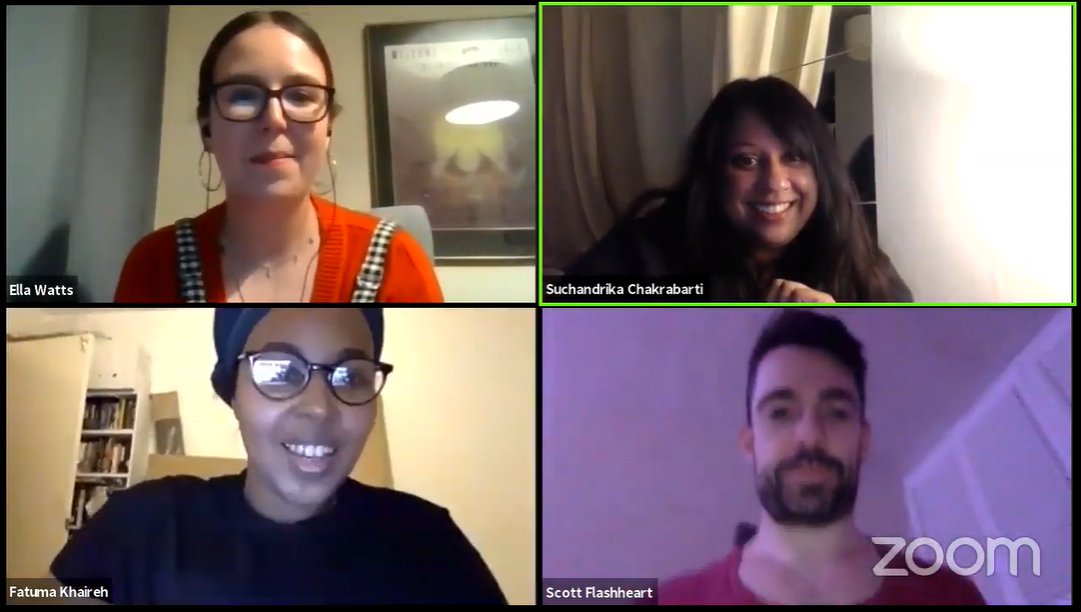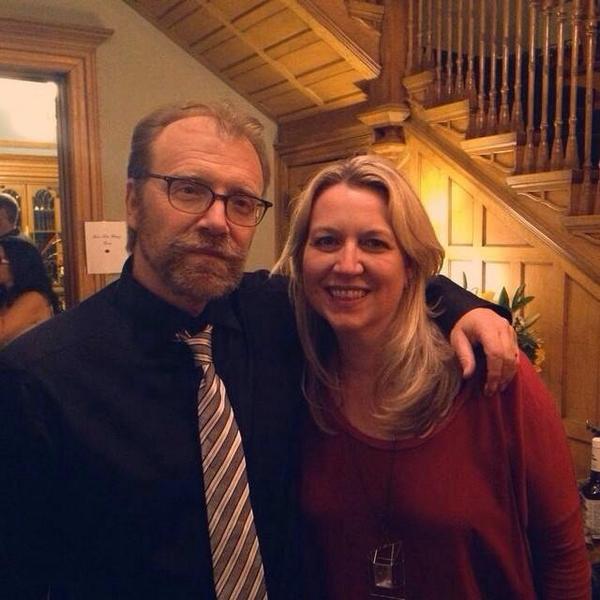Letters from Lockdown: On the future stories we'll tell
Hi all,
I’ve decided to keep writing the newsletter while we remain on lockdown - we could all do with more content to consume, right?
Fifty years from now, people the age you are now won’t believe this ever happened; or will do this sort of eye-roll we all do when someone tells us about something crazy that happened in 1960. What will convince that future kid is what you’re able to write about this.
- Writer George Saunders, in a recent email to his graduate students at Syracuse University, as read out on the new Sugar Calling podcast from the NYT
From top left, going clockwise: podcast folk Ella Watts, me, Scott Flashheart, Fatuma Khaireh
Firstly, a caveat: you don’t have to be productive in a pandemic. Say it with me: you don’t have to be productive in a pandemic. You absolutely do not have to be, in any way at all, productive in a pandemic.
That might be as far as you want to venture into this issue of the newsletter for now. That’s totally fine.
For anyone who does want to read about storytelling, that’s the theme of this edition.
If there’s one thing that has brought me joy during this lockdown, it’s how much more often I get to see my niece, who turns two next month. Her parents, my brother and sister-in-law, live in Bristol, so it’s not really a case of popping in. Instead, we’ve been on video chat much more.

There I am, looking at her with delight, even while she looks back at me with great suspicion
When she holds sustained eye contact with me (which is tough, as to her, I’m looking downwards to make eye contact with her; I should be looking at the camera), and responds to my requests for sand (she was making a sandcastle in the garden at the time), I wonder at how easily she accepts my presence as a mere floating head in the middle of her busy little locked-down day. It’s so normal for this tiny toddler to communicate with far-off family members in this way.
She doesn’t treat me all that differently on video chat, than in person, although in person she’ll want to hold hands and show me things and lead me around. With the video chat, she knows to bring things to the phone to show me, like how she’s going to put her favourite dolly in her pushchair.

Some lovely analogue 80s tech revived for Black Mirror: Bandersnatch
The difference in technology between her childhood and my 1980s one is astounding; and the ease with which small children pick up how to handle new tech is even more incredible.
I recently reviewed Wendy Liu’s book Abolish Silicon Valley, which charts through her eyes the birth, maturity and loss of innocence of the tech industry, which has all happened in the last few decades. In that time, the western world has lurched politically to the right, but Liu ends her book calling for socialism. Joining her in that call last week was Comrade Britney Spears, who was once a registered Republican; so, while pandemics have the power to change our politics, they’re not the only cause. Sometimes it’s just life experience that pushes our political dial one way or another, and tells the world that we’ve changed.
[You can access the whole of Red Pepper’s Spring issue for free here]
Even though she is present through this pandemic, my niece won’t have any real memories of this time. What she eventually understands about COVID-19 will be the stories we tell her about this time, and it’ll be a decade or so before she and I can really have a proper conversation about it.
If you’re a writer - and feeling up to it - it’s both somewhat boring and almost overwhelming to live through a historical moment (that’s without all the stresses of work, family, caring duties, money and so on), but it does feel important to document it as much as possible.
One day soon, the lockdown will be lifted and life will return to normal; this will all seem like a bad dream (side note: I’m having really weird vivd dreams at the moment, is anyone else? I don’t usually remember my dreams). All we’ll have are the stories.

Just before I decided to write this newsletter, I was listening to the first episode of the new Sugar Calling podcast, hosted by Wild author Cheryl Strayed, who used to write the Dear Sugar agony aunt column. Those columns are a masterclass in taking one’s own painful experience and applying it thoughtfully to another person’s problem, without taking over their story.
The writing is some of the most true-feeling and beautiful I’ve ever come across. I’ve saved some of my favourite phrases in emails to myself, such as “the shaky quake at the body’s core,” which shouldn’t work - the rhyme runs the risk of sounding a bit silly, like it’s not taking the subject of losing your mother seriously - but it does work, because if you’ve felt the continuing loss, then you know. You just know it to be true.
On Sugar Calling, Strayed rings up writers over the age of 60 whom she admires, and asks them: “How do we stay calm when everything has been upended? How do we muster courage when fear is all around us?”
On the first episode, she calls up George Saunders, who was her mentor when he took her MFA at Syracuse University twenty years ago. During their conversation, he reads out an email that he recently wrote to his students (click through for a slightly different version if you’d like to read the whole thing).
Here are the parts that struck me:
This is when the world needs our eyes and ears and minds… we are, and especially you are, the generation that is going to have to help us make sense of this, and recover afterwards. What new forms might you invent, to fictionalise an event like this?
…
Fifty years from now, people the age you are now won’t believe this ever happened; or will do this sort of eye-roll we all do when someone tells us about something crazy that happened in 1960. What will convince that future kid is what you’re able to write about this.
A piece I wrote on podcasters crowdsourcing audio during lockdown got me thinking about how we’ll have spoken testimonies to what life was like during the pandemic; and how audio can reach us and calm us when we’re too anxious for the news cycle. The experience of letting sound wash over us feels so much better than letting endless new updates drill down into our frazzled brains.

Piccadilly Circus, London, in June 1966 - by Richard Friedman
“That future kid” who Saunders mentions is, to me, my niece; I think about how the world of 2020 will feel very old-fashioned to her, our HD videos as grainy as this 1982 music video is to us now (h/t to the Storythings newsletter for reminding me of this gorgeous song!).
In a 2018 interview with the Wall Street Journal, Jackson said: “I don’t like New York much these days. It’s as if the city and I had a hot love affair and now we’re just friends, but we still have to see each other to remain friends. Today I live in Berlin. The New York I knew in late ‘81 and ‘82 is gone.”
The London that I live in now, and the Bristol of her childhood, won’t exist for her when she’s in her 20s and 30s; they’ll be stories we tell her, too, explaining the background to the pictures and videos of her as a child.

Masaccio’s Expulsion from the Garden of Eden, left, and his Tribute Money on the right, in the Brancacci Chapel, The Church of Santa Maria del Carmine, Florence
I recently wrote about living in Florence for six months when I was 22, and how I wove my own story into that of a six-century-old fresco. Like Joe Jackson’s ‘Steppin’ Out’, Masaccio’s Expulsion is undeniably of its time, but when I encounter it, I’m taken me back to a different era, the one in which I discovered it. For the fresco that’s 2005, and for the song, that’s most likely on repeat on UK commercial radio in the 1990s. A story, a song, a piece of art can have two backstories: the original one, and the one you bring to it.

My WFH desk
The pandemic may well have pushed through a lot of change that otherwise would have taken more time: working from home is definitely going to be one of them. I’ll be delivering training over Zoom for the first time next week, which is equal parts exciting and daunting. The other week, I took part in a Zoom panel about making audio on a budget:

Thanks again to @fatumakhaireh @GejWatts @ScottFlashheart @freelance_pod_ and everyone who watched, asked questions and supported! 
And there’s going to be an online podcast festival, if you’d like to get involved:
Back in the pre-Corona age, I recorded this episode of The Business of Writing podcast, where we talk about journalism and digital and grief and stand-up.
Lastly, here’s my second-ever comedy set, which I would’ve performed at The Betsey Trotwood in Farringdon, but turns out that became the first day of the UK lockdown. The organisers decided to make a video instead - my bit’s from 12:50ish. They’re making weekly episodes while we’re on lockdown, so you can submit something funny too:
I hope you stay safe and well, and get a little sunshine on your face - while social-distancing of course. We’ll get through this. There might only be a few more weeks of this strange existence.
Until next time! x





